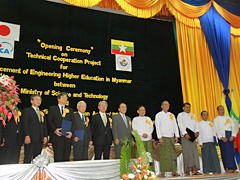JICA President Akihiko Tanaka was in Myanmar on Oct. 4 to kick off a technical cooperation project that aims to assist the country in training engineers needed to support its infrastructure and industry.
Tanaka attended the opening ceremony of the Project for Enhancement of Engineering Higher Education at Yangon Technological University in Yangon, Myanmar.
Since President Thein Sein assumed office in 2011, democratization and economic reform have been proceeding rapidly in Myanmar, and the country has enjoyed an inflow of foreign capital, including from Japanese companies. The development of infrastructure and industry has also progressed rapidly.

JICA President Akihiko Tanaka (seventh from right) attends the opening ceremony of the Project for Enhancement of Engineering Higher Education at Yangon Technological University in Myanmar.
On the other hand, a shortage of engineering personnel with the practical specialized knowledge and skills to support this progress is a critical problem. In the background, because of a longstanding lack of budgetary allocations to universities and university closings, almost no experimentation, practical training and research activities have been carried out at universities, and their education has been centered on memorization.
To improve this situation, the Japan International Cooperation Agency in October began the technical cooperation project the Project for Enhancement of Engineering Higher Education, which targets Yangon Technological University and Mandalay Technological University, Myanmar's top engineering universities. Its objective is training engineering personnel to shoulder the development of Myanmar's infrastructure and industry. By carrying out this project, JICA is supporting the improvement of practical departmental education and the strengthening of research capacity at the two universities.
Seven universities — Japan's Kyoto University, Chiba University, Niigata University, Kanazawa University, Okayama University, Nagasaki University and Kumamoto University — are participating in the project as supporting universities, and they plan to improve educational content and methods and give guidance on research by dispatching educators to Myanmar, as well as to welcome Myanmarese educators to receive their doctorates and undergo short-term training in Japan.
Opening ceremony participants included the presidents and vice presidents of the seven supporting Japanese universities as well as Dr. Ko Ko Oo, Myanmar's minister of Science and Technology, and the presidents and students of Yangon Technological University and Mandalay Technological University (about 250 people in all). In his speech, Tanaka used examples from Japan's experience to emphasize that in order for Myanmar to make the most of its present best opportunities for social and economic development, it is important that the country educate engineering personnel.




scroll